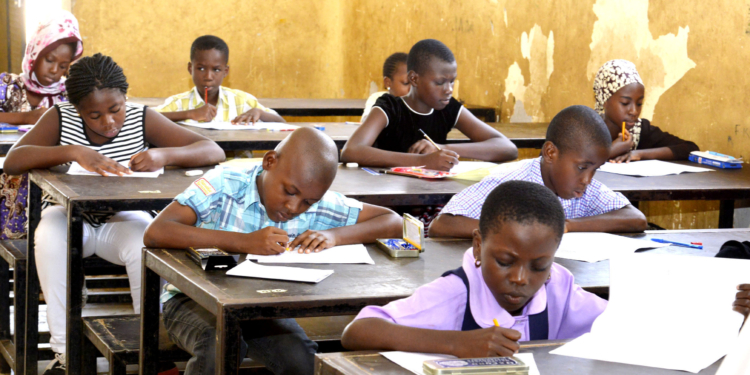The Nigerian government has condemned the practice of enrolling younger pupils below age 12 in secondary schools, describing it as a breach of the nation’s education policy.
The Permanent Secretary in the Federal Ministry of Education, Andrew Adejoh, said this on Saturday during the monitoring of the National Common Entrance Examination (NCEE) into the country’s federal government colleges, otherwise regarded as unity schools.
Mr Adejoh expressed the government’s determination to enforce the policy, insisting that the practice contributes significantly to the challenges facing the country’s education system.
He accused parents of “continually breaching the policy.”
“It’s in our National Policy on Education but observed more in the breach. (sic),” he wrote in a reply to clarifications sought by our reporter.
He added: “We are killing our children by allowing underage children to write the Common Entrance Examination.
“I saw children that I know that are not up to 10, and three of them accepted that they are nine years old. We are doing many things; one, we are teaching the children the wrong values. Education is not about passing exams. Education is teaching, learning and character formation.”
The permanent secretary has, therefore, directed the National Examinations Council (NECO), the government agency responsible for the conduct of NCEE, to henceforth make birth certificates a requirement for registration.
“Let our children get to an appropriate age before writing (sitting) this exam and we are going to make sure NECO puts in place appropriate checks. We didn’t want to get to where we will say bring a birth certificate but that is the stage we are going to now. In registering, we also upload the child’s birth certificate, so that at our own end, we are able to cut some of these things,” he said.
Every year, NECO administers the NCEE examination for pupils seeking admissions into any of the more than 100 federal government colleges.
This year, 72,821 pupils registered for the examination with Lagos and the Federal Capital Territory (FCT) accounting for the highest number of candidates, NECO Registrar, Dantani Wushishi, a professor, said.
He said Kebbi had the lowest number of candidates, with 115 registered pupils.
Just like the previous year, more girls registered for the examinations than boys, accounting for 38,000 compared to 34,000 boys.
This Mr Adejoh attributed to the government and its partners’ initiatives in bringing more girls to school.
Last year, 71,738 pupils sat the examination, out of which 34,030 were males and 37,708 were females.










Discussion about this post